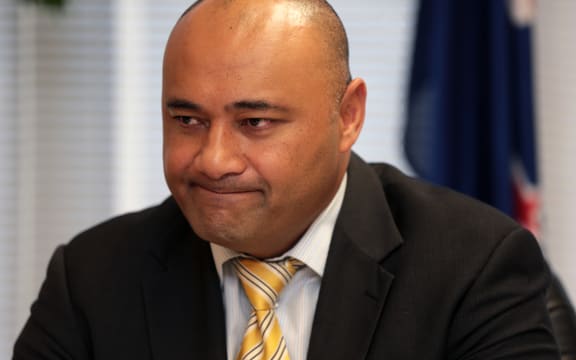Prison reform advocates say the recommendations that have come from a review into the escape of inmate Phillip John Smith are a massive overreaction, with one expert saying they amount to moral panic on a crazy scale.
Corrections Minister Sam Lotu-Iiga ordered an urgent review into temporary release rules after Smith, a convicted murderer and sex abuser, left the country while on temporary release.

Corrections Minister Sam Lotu-Iiga Photo: RNZ / Diego Opatowski
Mr Lotu-Iiga said all 13 recommendations from the review would be adopted.
The top three recommendations included the constant GPS monitoring of prisoners on temporary release, limiting the release period to 12 hours, and having greater oversight by a multi-disciplinary panel of all temporary releases.
Read the summary of the Chief Custodial Officer's review
Rethinking Crime and Punishment director Kim Workman said he was especially concerned by the recommendation to limit releases to 12 hours unless the National Commissioner approved a longer release.
"They seem to have lost sight of the purpose of temporary releases, which is [to] assist prisoners with reintegration," he said.
"Twelve hours is negligible, and it won't achieve that purpose."
Mr Workman said hundreds, if not thousands, of prisoners had successfully completed temporary releases.
"It's moral panic gone crazy, really. It seems to me the department is kow-towing to public opinion, rather than taking a rational look at what has happened in the past and supporting it by perhaps improving some of the systems."
Julia Whaipooti, from the criminal justice group Just Speak, said nearly 300 temporary releases were granted each year without problems.
"What's happened in this [Smith] case is quite unfortunate. [He's] only the fourth person in the last five years to have breached these conditions in quite a serious way," she said.
"We think that highlights there was a problem more with his assessment, than the overall system and granting temporary releases."
However, Ms Whaipooti did support the recommendation that a full review of the sponsorship process be undertaken.
"In this case, it's clear the sponsor for Phillip John Smith didn't really fulfill their duty in notifying Corrections when they knew he had gone missing or they hadn't had contact.
"That's something we would support, because that's quite a practical step, and would address the issue that happened in this case."
But Margaret Malcolm, an Auckland barrister and legal counsel for the Prisoner Aid and Rehabilitation Society, said it was important to keep in mind that when it came to temporary releases, public safety was paramount.
"These are prisoners who have been sentenced to prison, so they're being given a privilege, and that needs to be really carefully monitored," she said.
"There needs be proper systems in place to be able to adequately monitor them. If they don't have those systems in place, then clearly shorter relief periods become, unfortunately, necessary."
The recommendations in full
- All policies, procedures, instructions and instances of when prisoners are outside of the secure prison perimeter must be reviewed and updated as a priority.
- A Temporary Release Advisory Panel should consider all temporary release applications.
- GPS monitoring should be considered as the default for all prisoners on temporary release unless otherwise authorised by the prison manager.
- Contact monitoring arrangements for all prisoners on temporary release must be clearly described, accurately recorded on licence conditions and agreed to by the sponsor, employer, prisoner and prison manager.
- Temporary releases must be limited to a maximum of 12 hours unless approved and signed off by the national commissioner.
- A full review of the sponsorship process must be undertaken.
- An investigation should be undertaken into the psychological management of prisoner Phillip John Smith.
- A review of the Te Piriti child sexual offending programme should be undertaken.
- A weekly report of all prisoners subject to temporary release must be provided to the prison manager at the beginning of each business week.
- The revised prisoner placement system should be implemented as soon as possible.
- All relevant Corrections staff should be trained in the new temporary releases, process.
- All managers and staff must be reminded that during any incident a time bound log of events must be started and maintained.
- Internal control monitoring should include the temporary release application process.





